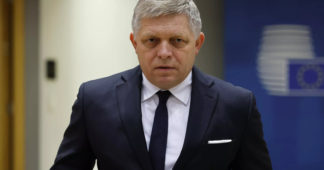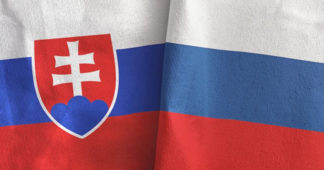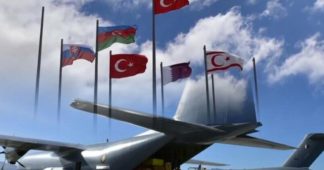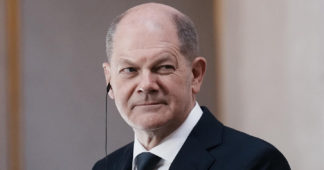Apr. 7, 2024
Slovak parliamentary speaker Peter Pellegrini, who shares prime minister Robert Fico’s staunch opposition to continued arms supplies to Ukraine, won the second round of Slovakia’s presidential election. Pellegrini and Fico’s left-wing opposition to the Russo-Ukraine war proved to be a winning formula.
In Peter Pellegrini Slovakia will finally have a president who does not support the pro-Western position and was not “installed by the Americans,” political observer Peter Marcek told Sputnik.
“There will be coordination between the government of the Slovak Republic [led by] Robert Fico and President Peter Pellegrini, because they have one program, one direction,” he remarked.
According to Marcek, “both Fico and Pellegrini share the idea that no Anglo-Saxons should be able to dictate to us what we should do.”
Washington pursued its own goals by pushing Pellegrini’s main rival, former foreign minister Ivan Korcok, for the presidency, argued the expert, in an effort “to subordinate our will exclusively to their hegemony.”
Pellegrini, an ally of Fico, won the presidential election with 53.26 percent of the vote versus Korcok’s 46.73 percent, following declarations from 99.66 percent of voting districts.
Pellegrini said his victory meant the government would not have to face an “opposition, opportunistic power centre.” He vowed that he would “be a president who will support the government in its efforts for improving people’s lives.”
Pellegrini, 48, has Italian ancestry. He previously served as Slovakia’s prime minister from 2018 to 2020 and Minister of Health from 2019 to 2020. He also hd a two-year stint as speaker of the National Council from 2014 to 2016. Pellegrini, formerly a member of Direction – Social Democracy, left that party to found Voice – Social Democracy in 2020.
The politician returned to the position of Speaker of the National Council after the 2023 parliamentary election. His Voice – Social Democracy party came third and became part of the three-party ruling coalition with PM Robert Fico’s SMER-SSD (Direction-Slovak Social Democracy) and the Slovak National Party.
Pellegrini announced his intention to run for president in January. He came second in the first round of voting in March, with 37.03 percent, trailing former Korcok who won 42.52 percent of the vote. But Pellegrini scooped up the floating voters to clinch the second round.
Commenting on Fico and Pellegrini long-standing political alliance, Marcek pointed out that “When the government passes laws and the president can veto them, it creates problems.” But now the president and the prime minister will be on the same page.
“Pelligrini will be a president who will work well with Fico. They said at a press conference after the elections that they would support each other. They will cooperate very well this way,” said the pundit.
In Slovakia, the government holds most of the executive powers, such as picking the prime minister after parliamentary elections, swearing in the new government, and appointing Constitutional Court judges. The role of president is largely ceremonial, but includes ratifying international treaties, appointing top judges and acting as commander-in-chief of the armed forces — and has the power to veto new laws.
Bratislava can no longer support the West’s anti-Russian course, noted Marcek, who welcomed the “clear victory of Pellegrini.”
“I think that many relations, for example, with the Russian Federation, can improve. We need to develop our mutual relations,” stated the former deputy of the Slovak parliament.
“I am grateful to Russia because it is not just fighting for itself, to prevent NATO from approaching the borders of the Russian Federation,” Marcek stressed. “Russia is fighting for us all, for the traditional family values, for improving the economic situation in the world. For good relations, and most importantly — for peace and justice.”
Fico’s government has been determined to chart an independent course against NATO’s proxy war against Russia in Ukraine.
Echoing his Hungarian counterpart Victor Orban’s stance, Fico has opposed confrontation with Russia, and urged an end to military aid to Kiev. Hungary and Slovakia are the only two EU and NATO members to refuse to send arms to Ukraine.
“Peter Pellegrini hails from Robert Fico’s party, he is a social democrat, and shares the PM’s ideas and views. This means that he is in favor of ending the conflict in Ukraine and starting negotiations between Kiev and Mosco,” Marcek said. “He is against sending weapons to Ukraine, opposes such vast quantities of EU aid being sent to Kiev.”
Pellegrini stated in an interview in March that the Slovak government had a realistic position on the conflict, and voiced surprise that some countries refuse to respect Slovakia’s approach. He added that Slovakia is ready to help the Ukrainian side in demining territories and implementing civilian projects.
The president-elect believes that the conflict in Ukraine has no military solution, advocates early peace negotiations and believes that arming Ukraine could ultimately lead to disaster.
Most Slovaks want “a president who will defend Slovakia’s national interests, who will not drag Slovakia into a war but will talk about peace, who… will put Slovakia’s interests first,” Pellegrini said.
In contrast, Pellegrini’s opponent Korcok, said: “I do not think Ukraine should give up part of its territory to achieve peace.” He told reporters that “Peace cannot mean capitulation,” and could only be achieved “immediately” on the condition that Russian troops withdraw.
Fico responded by calling Korcok a “warmonger” on video ahead of the run-off. He claimed Korcok “will support everything the West tells him without hesitation, including dragging Slovakia into the war.”
But both Pellegrini and Korcok have reiterated that they would not allow the Slovak military to be sent to Ukraine.
“Slovakia has made a decision that it will not send a single soldier to Ukraine in any event. And this is despite the criticism of this sovereign position of ours. On the contrary, we will insist that the only way to end the bloodshed is to have courage to begin peace talks between the warring parties,” Pellegrini said after a meeting with Orban.
On issues such as NATO membership for Ukraine, however, the two rivals took opposing stances. Korcok insisted that the final decision on Ukraine’s membership in NATO will be made by members of the alliance if the Ukrainian side meets the necessary requirements.
But Pellegrini was adamant that there is no place for Ukraine in NATO, giving an unequivocal “no” to the question during a pre-election debate on the Markiza TV channel.
“NATO, in my opinion, is the most aggressive group of armies, that only exist to foster wars all over the world, spearheaded by the United States. And Peter Pelligrini will absolutely not agree with this,” Marcek said.
Asked how Pellegrini’s victory could affect European Union policies and if Slovakia might use its veto on issues such as aid to the Kiev regime, the political analyst said that Slovakia now had “new opportunities.”
“We will not give up the veto power to anyone,” Marcek insisted. “This is our right, even though we are a small country. Together with Viktor Orban, 100 percent we will not cede this to anyone.”
Marcek slammed European governments that were “pro-American, pro-Brussels,” adding that “They are for war against Russia.”
“Macron still wants to send soldiers to Ukraine. The government in the Czech Republic wants to continue the war, but the citizens do not,” he said. “We say, ‘We shall have none of this’.”
We remind our readers that publication of articles on our site does not mean that we agree with what is written. Our policy is to publish anything which we consider of interest, so as to assist our readers in forming their opinions. Sometimes we even publish articles with which we totally disagree, since we believe it is important for our readers to be informed on as wide a spectrum of views as possible.











